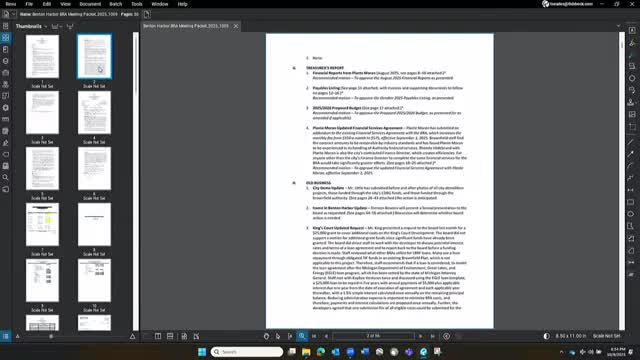Benton Harbor Brownfield Authority approves $25,000 loan to local developer
October 10, 2025 | Benton Harbor, Berrien County, Michigan
This article was created by AI summarizing key points discussed. AI makes mistakes, so for full details and context, please refer to the video of the full meeting. Please report any errors so we can fix them. Report an error »

The Benton Harbor Brownfield Redevelopment Authority voted 5-0 on Oct. 9 to offer a $25,000 loan to KB Ventures to finish multiple housing units the developer has already begun.
The loan will carry a five-year term with one annual payment of $5,000 plus 1.5% simple interest calculated once a year, and the board required that the loan be secured by a surety bond obtained by the developer before any funds are released.
The move follows months of board support for the Kings Court housing project and conversation between KB Ventures, the authority's adviser and staff. KB Ventures principal (identified in the meeting as Ms. King) told the board the company had completed several units and was using private funds and local contractors to proceed; she said the loan would allow the company to finish additional units and place more households in rental housing. "I've worked with Theresa; we've talked through what interest could look like, what a surety bond would look like," King said during the meeting.
Therese (city staff and Brownfield adviser) described the loan terms discussed with Ms. King and recommended modeling the agreement on an Existing EGLE loan template to ensure legally vetted contract language. Staff proposed annual payments to reduce administrative costs and suggested including default protections and a security instrument; the developer said she had explored bonds as a form of security.
Board members debated timing and fiscal capacity before the vote. Member Ivy Chandler moved to offer the $25,000 loan on the terms recommended by staff, citing the project’s community benefit; Member Miguel Clark seconded. A roll call vote recorded Adams, Warren, Chandler, Yates and Clark as voting "yes." The board directed staff to draft a formal loan agreement and have counsel review it before disbursing funds.
The board did not adopt additional penalties or a separate late-fee schedule beyond the proposed interest arrangement; staff said the drafted contract would define remedies and procedures for defaults.
The authority has previously contributed other funds to the project. Staff noted this is not an automatic grant and emphasized that any future loans or grants would require board approval and a legally executed contract.
The board indicated it may revisit internal policy and strategic priorities at a later date to guide future project support.
The authority plans to circulate the draft loan agreement for legal review and bring a finalized contract to the board for signature before releasing funds.
The loan will carry a five-year term with one annual payment of $5,000 plus 1.5% simple interest calculated once a year, and the board required that the loan be secured by a surety bond obtained by the developer before any funds are released.
The move follows months of board support for the Kings Court housing project and conversation between KB Ventures, the authority's adviser and staff. KB Ventures principal (identified in the meeting as Ms. King) told the board the company had completed several units and was using private funds and local contractors to proceed; she said the loan would allow the company to finish additional units and place more households in rental housing. "I've worked with Theresa; we've talked through what interest could look like, what a surety bond would look like," King said during the meeting.
Therese (city staff and Brownfield adviser) described the loan terms discussed with Ms. King and recommended modeling the agreement on an Existing EGLE loan template to ensure legally vetted contract language. Staff proposed annual payments to reduce administrative costs and suggested including default protections and a security instrument; the developer said she had explored bonds as a form of security.
Board members debated timing and fiscal capacity before the vote. Member Ivy Chandler moved to offer the $25,000 loan on the terms recommended by staff, citing the project’s community benefit; Member Miguel Clark seconded. A roll call vote recorded Adams, Warren, Chandler, Yates and Clark as voting "yes." The board directed staff to draft a formal loan agreement and have counsel review it before disbursing funds.
The board did not adopt additional penalties or a separate late-fee schedule beyond the proposed interest arrangement; staff said the drafted contract would define remedies and procedures for defaults.
The authority has previously contributed other funds to the project. Staff noted this is not an automatic grant and emphasized that any future loans or grants would require board approval and a legally executed contract.
The board indicated it may revisit internal policy and strategic priorities at a later date to guide future project support.
The authority plans to circulate the draft loan agreement for legal review and bring a finalized contract to the board for signature before releasing funds.
View full meeting
This article is based on a recent meeting—watch the full video and explore the complete transcript for deeper insights into the discussion.
View full meeting
